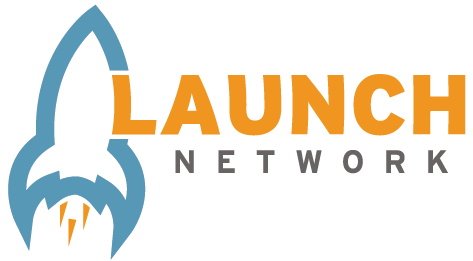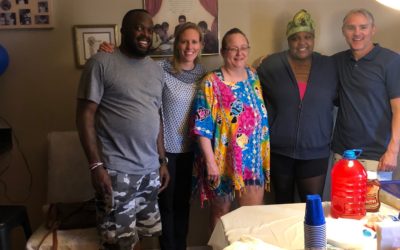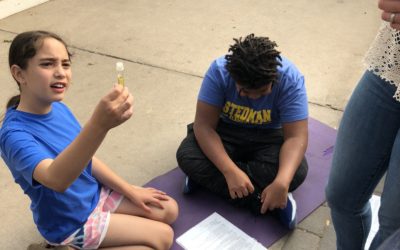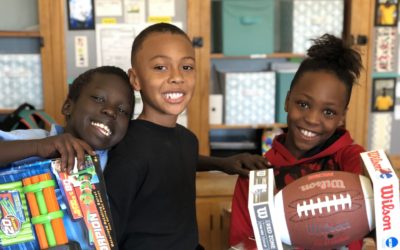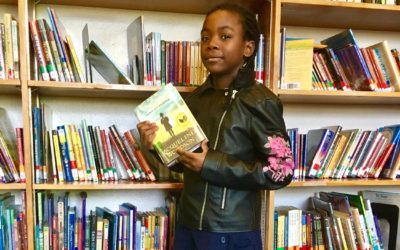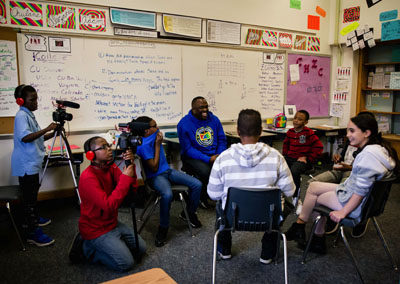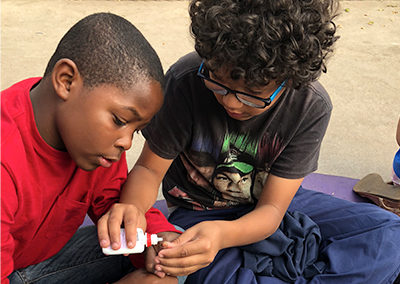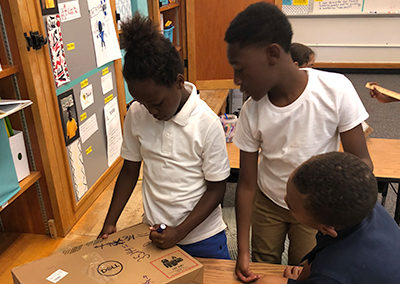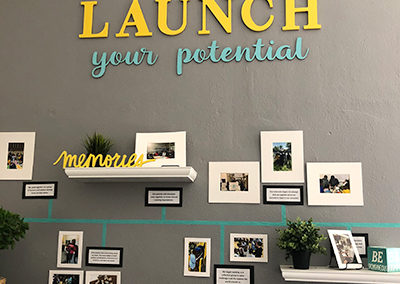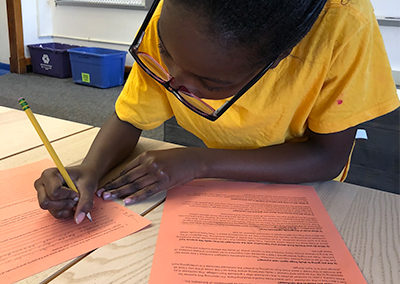What we do
Our Philosophy
Launch is unique because of our educational philosophy. We support young learners who want and need an alternative to the traditional classroom: they have unique needs and assets and do not thrive academically or socially in traditional environments. We work with families who want schools that develop their children’s academic, social emotional, and personal strengths. In response to our communities’ needs, rooted in evidence about learning, and grounded in response to our vision and values, we create learning environments that are small by design, promote deeper learning, cultivate a restorative culture, and serve the whole family.
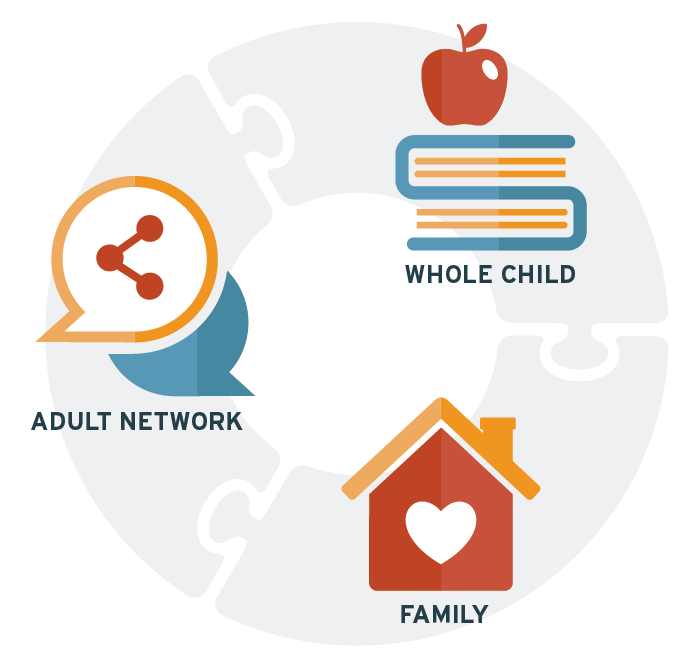
![]() The children who are furthest behind academically need and deserve a representative adult network. Children in the Launch Network succeed when supported by a network of adults, including those with whom they culturally and racially identify. Because the majority of Launch students are children of color, it’s important that Launch’s partners and community educators are equally diverse. Community organizations and their community educators have daily interaction with students and autonomy and decision making power over students’ social and emotional instruction. Students form lifelong relationships with a network of diverse adults based in their community who they can turn to for support.
The children who are furthest behind academically need and deserve a representative adult network. Children in the Launch Network succeed when supported by a network of adults, including those with whom they culturally and racially identify. Because the majority of Launch students are children of color, it’s important that Launch’s partners and community educators are equally diverse. Community organizations and their community educators have daily interaction with students and autonomy and decision making power over students’ social and emotional instruction. Students form lifelong relationships with a network of diverse adults based in their community who they can turn to for support.
![]() Children thrive with multi-generational support. Generations have been failed by schools. In deep collaboration, Launch and their partners work to build transparent, trusting relationships with both students and their families. The community of Launch educators provides support to both generations with access to community resources, by serving as partners and advocates in their student’s educational experience, and empowering parents to continue facilitating their child’s education after they’ve graduated from the program.
Children thrive with multi-generational support. Generations have been failed by schools. In deep collaboration, Launch and their partners work to build transparent, trusting relationships with both students and their families. The community of Launch educators provides support to both generations with access to community resources, by serving as partners and advocates in their student’s educational experience, and empowering parents to continue facilitating their child’s education after they’ve graduated from the program.
The Launch approach is based on the years of experience all educators bring to the partnership. Founders Sarah Rauenhorst and Justin Darnell bring expertise from their combined 25 years in education, most of it in the classroom. CHIC and Kids Above Everything leaders Sade Cooper, Dane Washinigton, and Kirk Stevenson bring their combined 25 years of doing work in their community to improve the outcomes of youth and young adults.
And of course, all of Launch’s essential elements are research based. Launch’s value and impact is not solely because we incorporate these research-based elements, but because we uniquely bring together multiple organizations and leaders to weave together so many of these research-based elements.
What Fuels the Launch Model:
The Challenge
Societal Inequities
There are deep and pervasive societal inequities which wreak havoc on our kids and communities of color. These inequities are generational, colonial, based on power and privilege, and complicated. They result in large gaps in life outcomes for individuals purely based on their race and where they grew up. (Opportunity Insights’ research on racial disparities)
Education Inequities
Launch believes it is not one thing that causes and perpetuates achievement and opportunity gaps, but many complex factors. There are achievement gaps that begin early, unfairly and inequitably impact kids of color, and grow overtime. (“Rethinking the Achievement Gap” by Andy Porter) There is also an opportunity gap in students of color’s access to high quality and rigorous educational experiences. (The Opportunity Myth)
Solutions
Collective Impact
Closing achievement and opportunity gaps is not something that can be done by one person, one school, one organization, or one community. It requires a collective impact approach in which organizations align their goals, activities, and ultimately impact. (“Collective Impact” and “Does Collective Impact Really Make An Impact?” from Stanford Social Innovation Review)
Social Networks
There is a significant amount of untapped potential currently living in kids of color and kids from low-income communities. Increasing their access to successful mentors who are from their community and culture can ignite their potential and set them on a course to success. (“Who Becomes an Inventor in America? The Importance of Exposure to Innovation” from Opportunity Insights)
Adult Influences
Educators of color tend to hold higher expectations for students of color than white teachers and when students of color or students from low-income communities are held to high-expectations they excel and meet those high expectations. (“Choosing the Opportunity Gap” from The Opportunity Myth) In addition, high-quality teachers directly impact students’ ability to succeed and ultimately improve life outcomes including increased educational levels, earnings, quality of neighborhoods, and savings for retirement. (Opportunity Insights)
Authentic Whole Child Education
Educating a child is more than just about improving test scores. An authentic whole child education is about providing an environment which balances social, emotional, academic, mindset, and behavioral development in a culturally responsive manner that applies to real world scenarios. (“The Influence of Teaching Beyond the Achievement Gap” from The Achievement Gap Initiative at Harvard University and “Designing for Learning” from Transcend)
Trauma-Informed Approaches
Kids who come from low-income communities tend to have more exposure to adverse childhood experiences also known as trauma. (“Adverse Childhood Experiences” from the Center for Disease Control and Prevention) Fortunately, educators play a critical role supporting students as they navigate their trauma and ensuring school is a safe and supportive place. (Trauma Learning and Policy Initiative and Neurosequential Model in Education)
Family and Community Integration
Families and the communities in which they live are critical experts and educators of their children. Through generations of oppression and discrimiantion, schools have degraded trust with families of color. Schools and educators must rebuild trust with families, have honest and transparent conversations about how the two entities can support each other, and build family advocacy. (“Effective Family Engagement Beings with Trust” from Dr. Karen Mapp of the Harvard Graduate School of Education)
Childhood Development
Children develop within a nested ecological system. Individuals and societal factors at each distinct level impact children’s development; therefore, protective and preventive factors must reach each environment and the individuals involved in a child’s development. (Bronfrenbrenner’s Ecological Theory of Development and Gracia Coll’s Integrative Model for the Study of Developmental)
Our Strategy
How we get there:
- Focus on breadth over depth within the partner school
- Staff and community partners embedded across partner school
- Impact on emotional, social, and academic performance for students who are behind in all three domains
- Shift systems, structures, and adult mindsets to identify an appropriate balance between social, emotional, and academic instruction time and to build strong and trusting relationships with families
![]() Micro schools are intimate, personalized, and holistic learning environments designed by educators and families and operated as a program within existing schools and with community organizations.
Micro schools are intimate, personalized, and holistic learning environments designed by educators and families and operated as a program within existing schools and with community organizations.
- Focus on depth over breadth within the partner school for a cohort of students and families
- Staff and community partners embedded within the micro school inside the partner school
- Significant impact on emotional, social, and academic performance for students who are significantly behind in all three domains
- Continuing alumni support once students and families have graduated from the Launch program
![]() Pathways to impact include incubating new school models, developing next generation leaders, and studying and sharing what we learn through innovation R&D. Micro schools and incubators are not intended to be a solution for every student, family, or school; they are intended to be solutions for the students, families, and schools who need and want them.
Pathways to impact include incubating new school models, developing next generation leaders, and studying and sharing what we learn through innovation R&D. Micro schools and incubators are not intended to be a solution for every student, family, or school; they are intended to be solutions for the students, families, and schools who need and want them.
- Responding to the desires of families, schools, and community through deep partnership and shared decision-making with families, schools, and community
- Support Denver and other districts achieve their goals of universal achievement by targeting solutions for specific students who are currently not being served
- Co-create communities that band together to support their families and schools
Launch scales the same way we operate, with a collective and customizable approach. Launch and our partners collectively work with schools and communities to understand their needs and provide a service which they determine is the best fit: a micro school or an incubator. Interested in bringing Launch to your school or community? Reach out to us.
Launch Stories
The Launch Story
In 2020 75.9% of 3rd graders from low-income families in Colorado are BELOW grade level in literacy. Yes, you read that correctly, in 2020 these are the actual numbers. Every year, THOUSANDS of kids are failed by the collective actions and inactions of adults…
Meet Mia
After a successful year with Launch, Mia is now thriving in 6th grade. She’s fully immersed in the traditional classroom setting and her grades have improved. She’s even found a love of reading! Mia is accepting of feedback and responds well when teachers push her to do better.
Meet Jakhi
“I can see the growth, I can see the change,” Jakhi’s mom says. “Launch has been very beneficial for Jakhi. Launch has been a breath of fresh air.”
Meet Leila
This year I am in a classroom with the third and fourth grade and sometimes it’s hard to learn like that. But it’s helping me be a leader and get better things for my life.
Report Card
LAUNCH NETWORK SINCE 2017
students served by Launch's social, emotional, and academic supports
family members who participated in Launch Network’s multi-generational supports
partner school staff with whom Launch worked to support students
partner school students who Launch impacted with consulting and coaching services in the 2018/19 school year
average grade-level improvement of intensive Launch students in reading and math after 9 months of participation
MICRO SCHOOL — STEDMAN ELEMENTARY
students
%
qualify for free and reduced lunch
%
students of color
average years behind grade level performance
family members
Students and families who participated in the micro school saw significant social, emotional, and academic gains. Emotionally and social students improved in their self-confidence, mindsets, self-control, executive functioning, and persistence. With a strong and flourishing social and emotional foundation, students made tremendous academic growth in both reading and math on nationally normed assessments and Colorado’s standardized state assessments, CMAS.
- 100% of our students were assessed in the “normal” range for emotional wellness when only 20% of these students were this range the year prior.
- Students’ time on-task and engaging learning rapidly increased.
- Launch students’ 2019 CMAS average indicates rapid acceleration, closing the achievement gap. Launch students’ averaged in the 70th percentile for growth (DPS averaged a 52nd percentile for growth).
- In 9 months Launch students on average demonstrated 1.7 years of reading gains as measured by nationally normed assessments.
- On the same assessment, MAPS, Launch students on average demonstrated 2 years of math gains in just 9 months.
- Through rebuilding trust Launch made impacts on parents’ beliefs about school and their students. Parents were confident in their abilities to make sure their children’s school met their children’s learning needs and their abilities to make choices about their children’s schooling in the future.
